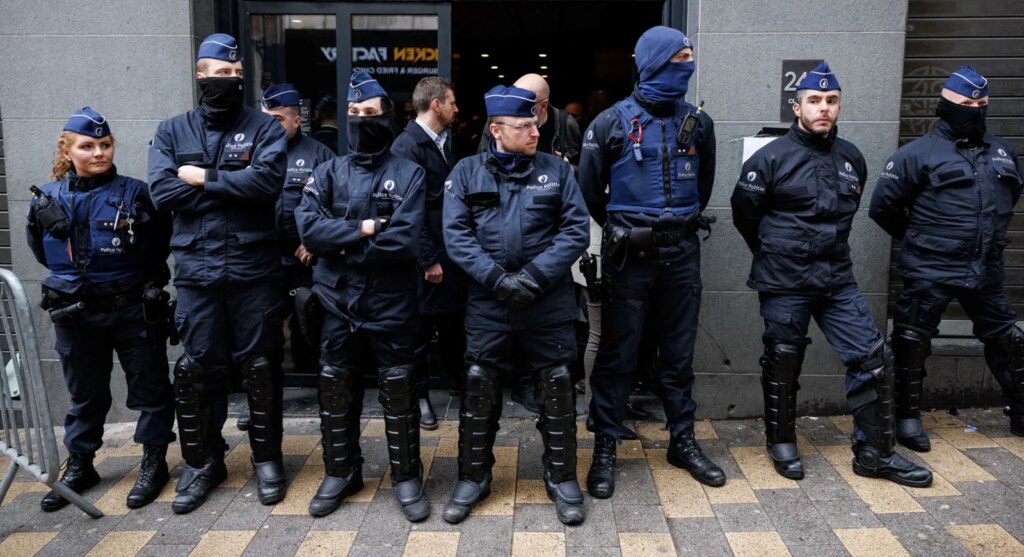The Brussels mayor of Saint-Josse was recently in the news for all the wrong reasons. Emir Kir was the third local mayor who issued an order to ban the National Conservatism Conference (NatCon) from taking place in Brussels under the pretext of expected demonstrations against the conference and guaranteeing public safety.
But he did not hide his own feelings. On X he said: “In Etterbeek, Brussels City and Saint-Josse, the far-right is not welcome.”
NatCon is an annual gathering of the who’s who of the anti-EU and anti-liberal far-right from the EU, the US, the UK and other countries. This year’s event included Nigel Farage, Suella Braverman, Viktor Orbán and Éric Zemmour. The programme featured themes such as “Why Should We Prefer Our Own Culture to Others?” or “Challenging Wokeism: An International Matter”.
After days of wrangling and two cancellations of venues, the conference finally went ahead at the Claridge Hotel in Saint-Josse - but only to be shut down hours later by police at the request of the mayor.
A media circus ensued with Murdoch’s pundits blasting the Brussels mayor across their newsrooms in London, New York and Sydney. A political and legal storm followed. Prime Minister de Croo called the decision “unacceptable”. Rishi Sunak weighed in on the threat posed to free speech.
A final court order overturned the ban and the conference went ahead the next day. According to the ruling, the ban violated freedoms of assembly and expression and the mayor should have made every effort to ensure that that conference could go ahead peacefully.
The police in the service of dictatorships
While those on the left could enjoy a moment of delicious irony seeing Suella Braverman, who had branded pro-Palestinian protests in the UK as “hate marches”, being censored as a threat to public order, police shutting down conferences is not the way how to fight populism, illiberal democracy and new forms of fascism.
The police should not be used in this way in a democracy. In the 1930s, German police colluded with the Nazis in their persecution of Jews, socialists, communists and other political opponents. The regime relied heavily on the police to carry out its policies by implementing systems of persecution against dissidents and people they dehumanized. We know what that would lead to.
The Guardia Civil in Spain is still dealing with its shameful Francoist past. In the UK, undercover police infiltrated activist circles throughout the 1990s, posing as sympathetic comrades, forming relationships, even fathering children while using false identities.
A look at modern policing in all its forms of violence against students, migrants and minorities - overseeing brutal evictions or cracking down on protests and freedom of assembly - the police do not even today espouse the basic liberal European values we should be able to take for granted.
No PR is bad PR
Emir Kir’s undemocratic decision only played into the hands of its Nat/Con organisers and participants. Farage could barely contain his delight when he learned that the police were coming. “If they are going to close it down, they can close it down with me on stage,” he said, cheered on by his audience. Instead of being framed as the bully, the event and its organisers became the victims.
The illegal police action deflected the attention from their hateful rhetoric against migrants and minorities. Banning opinions, ideologies or events doesn’t work.
Like moths to a flame, humans cannot help our morbid curiosity to see what shall not be seen, read what shall not be read. Cancel culture - as nebulous as this term is - has often done more to embolden the right than silence it. Donald Trump weaponised this, spurring on his supporters to believe their constitutional rights were under threat from the “woke-brigade”, eventually culminating in claims that the election was stolen and prompting the storming of the Capitol.
Freedom of expression in crisis
EU-wide civil rights organisation, Liberties, warned last year of declining rule of law as well as a crackdown on peaceful protests across member states. The treatment of peaceful pro-Palestinian events, in particular, highlights an authoritarian tendency in a number of member states.
A recent pro-Palestinian event in Berlin got similar treatment from the police as NatCon in Brussels. In this case participants such as a British-Palestinian doctor, Ghassan Abu Sittah, and the former Greek finance minister, Yannis Varoufakis, received bans from entering Germany.
Amid this rising authoritarianism, Irene Khan, the UN Special Rapporteur on the promotion and protection of the right to freedom of opinion and expression warned: “The Gaza crisis is truly becoming a global crisis of freedom of expression [destined] to have huge repercussions for a long time to come.”.
Shutting down peaceful protests or conferences in this way will only lead to greater societal polarisation and confusion over where the boundaries of permissible free speech actually lie. Antisemitism, Islamophobia and any kind of hate speech or incitement to violence must be prohibited. But people’s right to express themselves politically, even if we disagree, must be protected.
As Yannis Varoufakis, after hearing that NatCon was shut down, said: “I’m no political friend of Nigel Farage but I would hate it if anyone like Nigel was prevented from speaking merely because he may say things that may annoy, among other people, myself.”


